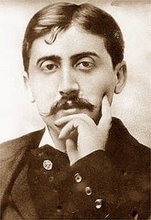
Now that it is summer, and I have been gardening without the protection of a wide-brimmed hat, I have been having strange fantasies. Specifically what would Mr. Proust, aka the narrator of Swann's Way, be like in real life? Or better yet what would it be like to have dinner with him and a tableful of my favorite authors? (Cue flashback harp music and rippling visual effects).
At the head of the table is moi. This is my fantasy so I get to look like Audrey Hepburn in Breakfast at Tiffany's, complete with retro eye liner, beehive hairdo, long black gloves and fabulous dress. To my left is Marcel. He has complained about the chill in the room in his high-pitched whining voice so many times that we broke down and lit the fire even though it is eighty-five degrees outside. This is still not enough for him, so he wraps his mother's shawl around his thin shoulders and warms his hands over a candle. Next to him is Ernest Hemingway--I know, I know. It was a naughty trick to put those two together, and I am now regretting it. Ernest has decided to forgo the formality of a wine glass and clenched in his fist, he has a bottle of Jack Daniel's, which he takes slugs of at regular intervals. He has already caused Marcel to burst into tears once this evening by calling him a "pussy" and threatening to "kick his ass." If there is another such incident, I may have to intervene.
Beside Ernest is George Orwell (Eric Blair). He arrived late as usual, offering a profusion of apologies and a bunch of roses, which I believe came from my front hedge. His hair is greasy, his nails filthy, but his aristocratic English accent is so lovely and charming, I cannot resist him. You can always tell an Eton man. Must find a subtle way to remind the others to steer the conversation away from the current political climate or we'll have another hour and a half diatribe. Nothing kills a good dinner party quite like an Orwellian anti-fascist screed. Poor George, though. He is telling a perfectly lovely story when a dinner roll pops out of his shirt pocket. He pretends it had fallen in there by accident, but we are all aware of his "scavenging." Luckily, he is sitting next to Albert Camus so there are plenty of cigarettes for him to bum. Albert is in a brooding mood tonight. I can barely make out his bored countenance behind a thick blanket of cigarette smoke, but am pleased he is at least making the effort to nod his head from time to time in response to Charles Dickens who is relating yet another story from his childhood. When he gets going, all dinner conversation must come to a halt for the difficulty of being heard over his booming voice. Charles's stories are so entertaining, but they do tend to go on, often ending with him scratching his great wooly beard and murmuring, "I did have a point to this. What was it, exactly?"
To my right, Agatha Christie and Stephen King are giggling over their extra-rare steaks. Due to last month's unfortunate incident, I have supplied them with plastic cutlery and left the chairs on either side of them empty. I know they were only being playful, but the others complained, particularly Marcel, and he did have a point this time, what with the stitches and all.
Still for all their quirks, my guests can spin a good yarn. All too soon, it is time for dessert and coffee. Agatha immediately offers to serve and runs into the kitchen. She returns moments later, grabs a brown bottle from her handbag then darts out again. Stephen smiles, and I am immediately suspicious. Marcel is listing his many allergies and describing in great detail how it feels at the precise moment when his congestion becomes a sinus infection. Ernest has moved on to absinthe after polishing off the Jack Daniel's and has been leering at me for some time. I am thankful that Marcel sits between us, though I know he will really be of no help if things get out of hand. Agatha returns to the dining room with a pot of coffee and a wicked smile. Stephen puts up a hand in refusal as does everyone at the table. Agatha glares at each of us in turn. "What? No coffee?" She slams the coffee pot on the table and sulks back to her seat. The table cloth sizzles and dissolves into smoke where the coffee has spilled.
Albert who has been silent for the entire evening chooses this moment to turn to George and say, "So, what do you think of the Patriot Act?" George's face lights up. Albert inhales deeply on his cigarette and smiles across the table at me. The rest of us moan and contemplate the coffee. Suddenly, it doesn't seem so bad after all.

